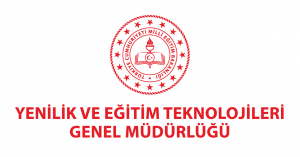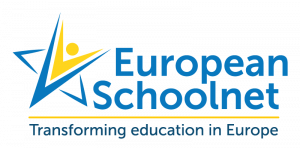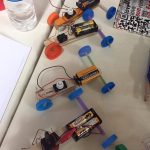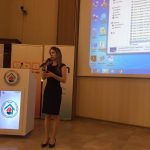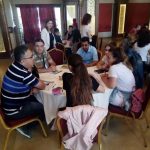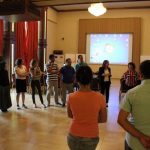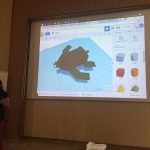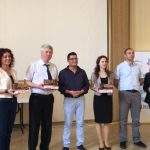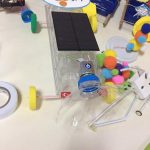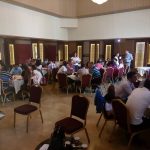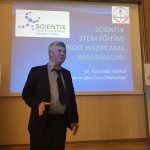Dokuzuncu Scientix STEM Eğitim Çalıştayı, 22-24 Mayıs 2017 tarihlerinde Mersin suphi Öner Öğretmenev’inde gerçekleşmiştir. Bu çalıştayın amacı, Lise ve mesleki ve teknik okullarda görev yapan STEM (Fen, matematik, fizik, kimya, biyoloji, vb.) öğretmenleri ve mesleki ve teknik liselerde görev yapan öğretmenler (elektrik ve elektronik teknolojisi, bilgi teknolojisi, mobilya teknolojisi, makine teknolojisi, metal teknolojisi, vb.) arasında disiplinlerarası bir STEM eğitim projesi geliştirme ve paylaşma ortamı oluşturmaktır. Çalıştayda öğretmenler her grupta en az birer tane fen, matematik, fizik, kimya, biyoloji ve meslek ve teknik okul öğretmeni olacak biçimde çalışma gruplarına ayrılmıştır. Her grupta bu farklı ders alanları öğretmenleri, öğrenciler için disiplinler arası sorgulamaya, araştırmaya, üretime ve buluş yapmaya dayalı STEM proje önerileri hazırlamak için birlikte çalışmışlardır. Bu çalıştayın sonunda, öğretmen grupları tarafından öğrencileri Fen ve Mühendislik mesleklerine teşvik etmek ve STEM konularında beceri ve tutumlarını ortaya çıkarmak için aşağıdaki STEM eğitim projeleri tasarlanmıştır:
- Görme Engelliler için Şehiriçi Ulaşım Bilgi İstasyonları: Görme engellilerin şehir içi ulaşımını kolaylaştırmak amacı ile bilgi İstasyonlarının kurulması, görme engellilerinin bastonlarıyla etkileşimli bilgi istasyonları tarafından görnme engelliye bulunduğu noktaya yakın duraklar, AVM’ler, hastaneler, vb kurumlar hakkında sesli bilgi verilmesi,
- Trafikte Ambulans ve Öncelikli Araçlara Yol Veren Akıllı Kavşak Sistemi: Trafikte ambulans, itfaiye, polis, vb. öncelikli araçların yaklaştığını bildiren, diğer araçları yönlendiren ve güvenli bir şekilde geçiş sağlayan elektronik cihazların geliştirilerek kavşaklarda kurulacak bu sistem ile araçlara gerekli yönlendirmenin yapılması
- Akıllı Işıklandırma Sistemi: Ortamlardaki ışık miktarını analiz edip, ortamın her yerine eşit miktarda ışık almasını sağlayan, enerji tasarrufu sağlamak amacıyla lambaların ışık seviyesini ayarlayarak insanların ihtiyaç duyduğu optimum ışık seviyesini ayarlayan akıllı bir sistemin geliştirilmesi
- Enerji Tasarruflu Su Isıtma Sistemi: Güneş enerjisiyle su ısıtma sistemlerinde musluktan sıcak su gelene kadar akan soğuk su israfını önlemek için musluğa gelen su sıcaklığını algılayan sensörler yerleştirilerek musluğa istenilen sıcaklıkta su gelene kadar soğuk suyu depoya pompalayan su yeterli sıcaklığa geldiğinde sıcak suyun musluktan akmasının sağlayan bir sistemin geliştirilmesi
- Öğrencilerin Hareket Enerjisinin Elektrik Enerjisine Dönüştürülmesi: Spor aletleri ile öğrencilerin hareketi sonucu üretilen elektrik enerjisi ile okullarda tablet, vb. cihazların çalışması sağlanacaktır.
- Engelli Bireyler İçin Ev İçi Eşya ve Cihazların Ses ile Uzaktan Kontrolü: Hareket engeli bulunan bireylerin kendi yaşamlarını evlerinde kolayca idame ettirebilmeleri için ev içerisindeki lamba, fırın kapı, pencere gibi günlük yaşamda sıkça kullanılan cihazları sesle kontrol edebilmelerini sağlayacak elektronik cihazın geliştirilmesi
- Teknelerdeki Korozyonun Önlenmesi: Balıkçı teknelerinin uzun süre denizde kalmalarından dolayı oluşan yosun ve midye tabakalarının sebep olduğu korozyonun önlenmesi için deniz kaplumbağalarının kabuklarının incelenmesi ve gemi yüzeylerinde organizma üremesini engelleyecek organik ürünlerin geliştirilmesi
- Koligatif Malzeme ile Karanlık Ortamların Güneş Işığıyla Aydınlatılması: Koligatif malzeme (su, çamaşır suyu ve bakteri) içeren bir sıvı ile ışığı yansıtarak gece ya da gündüz saatlerinde karanlık ortamların aydınlatılmasının sağlanması
Scientix Türkiye Ekibi olarak her okulun STEM projelerinin olması gerektiğini düşünüyoruz. Bu STEM projeleri öğrencilerin sorgulama, araştırma, üretme ve buluş yapma becerilerini geliştirmeye yönelik olmalıdır. Proje ekiplerindeki öğretmenler ve öğrenciler STEM projelerini gerçekleştirmek için diğer okullar ve endüstri ile birlikte yardımlaşarak çalışabilmelidir. Temel amacımız, her okulun STEM proje takımlarını oluşturması ve bu takımların STEM çalışmalarını yapabilecekleri öğrenme ortamlarının okullarımızda oluşturulmasıdır.
9th Scientix STEM Education Workshop was held at Mersin Suphi Öner Öğretmenevi on May 22-24, 2017. The purpose of this workshop was to create an interdisciplinary STEM education project development and sharing environment among STEM (science, mathematics, physics, chemistry, biology) teachers who work in secondary schools, high schools and vocational and technical schools (Electricty and electronics technology, information technology, furniture technology, machine technology, metal technology, etc.). Teachers were grouped into study groups in each group there was one of each science, mathematics, physics, chemistry, biology and vocational and technical school teachers (Electricty and electronics technology, information technology, furniture technology, machine technology, metal technology, computer programming, etc.). These teachers with different subject areas studied together to study and prepare a multi-disciplinary inquiry, research, production and invention based STEM project proposal for students. At the end of the workshop, the following STEM education projects were designed by the teacher groups to encourage students to Science and Engineering professions and to uncover their skills and attitudes in STEM subject areas:
- Urban Transportation Information Stations for Visually Impaired People: Establishments of Information Stations Providing voice information for the purpose of facilitating the visibility of visually impaired people in the city. Interactive information stations intercept with the canes of visually impaired person can give voice information about places such as bus stops, shopping malls, hospitals, etc. close to the point where visually impaired person stands.
- Intelligent Crossroads System that Gives Way to Ambulances and Other Priority Vehicles in Traffic: Developing electronic devices which will be installed at road intersections and vehicles for notifying vehicles that priority vehicles ambulances, fire, police etc. in traffic are approaching, directing vehicles and switching their ways safely.
- Intelligent Lighting System: Developing an intelligent system that analyzes the amount of light in an room and adjusts the light level of the lamps so that people get the same amount of light in the room by automatically adjusting the light level of the lamps to save energy.
- Energy Saving Water Heating System: In solar water heating systems, in order to prevent the cold water flowing from the faucet, sensors that detect the water temperature are placed to the faucet. And cold water will be pumped back to the water tank until the water in the desired temperature comes to the faucet.
- Conversion of Students’ Movement Energy to Electricity Energy: Tablet computers, etc. devices in schools will be operated with electrical energy produced from the movement of students at sports equipments in the schools.
- Remote Control of Furnitures and Devices in Houses for Disabled Persons: The development of an electronic device that enables people with motion disabilities to easily manage their own lives at home by using their voice to control frequently used devices such as lamps, ovens, doors, windows, etc. in their home.
- Prevention of Corrosion on the Boats: Examination of the shells of sea turtles for development of organic products to prevent corrosion caused by moss and mussel beds on fishermen ‘s boats by staying at sea for a long time.
- Illumination of Dark Environments with Colligative Material: Reflecting light with a liquid containing colligative material (water, bleach and bacteria) to illuminate dark areas at night or during daylight hours.
We think that every school should have a STEM project. And all STEM projects are interdisciplinary. To improve their questioning, researching, producing and inventing skills in these STEM projects, teachers and students in project teams should study and work with other schools and industry in collaboration to realize their STEM projects. Every school should have their STEM project teams. STEM Project teams should firstly anayse the disciplines (Science, Math, Engineering, Art, Language, Physics, Social Studies, etc.) that are necessary to complete their STEM projects.

